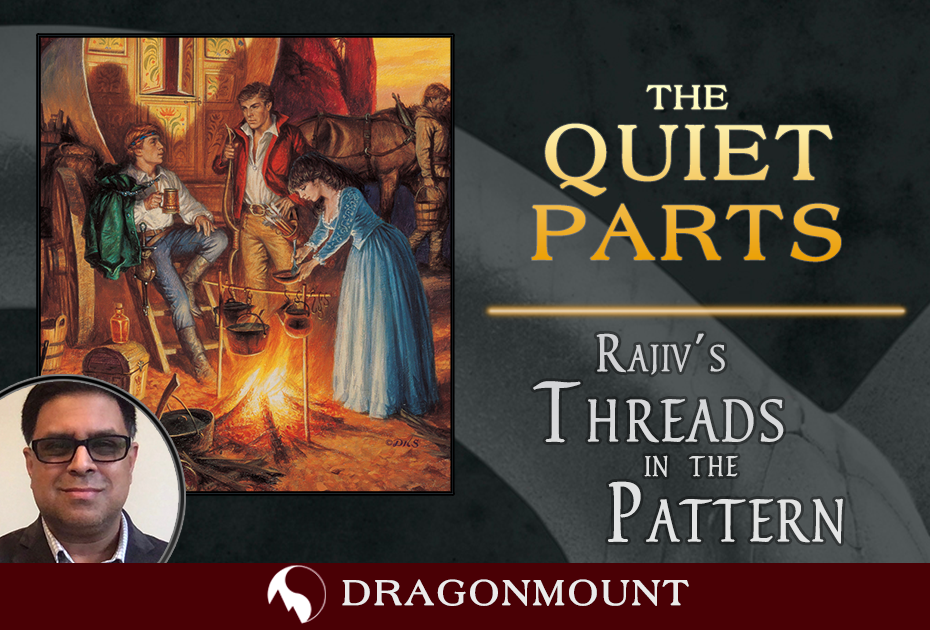
Rajiv Moté is Dragonmount’s book blogger with a lens on the craft of fiction writing. When he’s not directing software engineers, he writes fiction of his own, which can be found catalogued at his website.
As the Four Horsemen of the Apocalypse rampage across the news headlines, there is a trend in fiction circles gaining traction with those who seek respite in imaginary worlds. “Cozy fantasy” is a sort of comfort food genre where conflict is minimal, the stakes are low, and endings (if not beginnings and middles) are, well, cozy. Travis Baldree’s Legends and Lattes is about an Orc barbarian who retires to open a coffee shop. Wyngraf, a new, online fantasy magazine is devoted to cozy fantasy and explains the genre’s parameters and inspiration on their site. An upcoming fantasy magazine, Tales & Feathers, plans on publishing “slice of life” fantasy to “luxuriate in the vignette and celebrate quiet beauty.”
Fans of the fantasy genre know that the quiet moments have long been a secret pleasure in even the most high-stakes, battle-to-save-the-world stories. The journey is long, hard, and dangerous, but there are places of safety and comfort--however temporary--along the way. It’s usually when our heroes have time to reflect and gather themselves that they find the courage and stamina to press on. Other Dragonmount articles discuss treatments of home and how prologues and epilogues help address the smaller, beloved plot beats. (I have a cozy, quiet story published in Wyngraf #1 called “Epilogue” that explores the themes in those two Dragonmount articles.)
“Cozy” often works in a story as an antidote for hardship. It is the contrasting texture that keeps an otherwise grim tale from numbing the reader. We, like the characters, require rest and solace, a chance to give our adrenal glands a break. We need a reminder of the good in the world worth fighting for. Samwise Gamgee said it best in the movie adaptation of The Two Towers.
Quote“It's like in the great stories, Mr. Frodo. The ones that really mattered. Full of darkness and danger they were. And sometimes you didn't want to know the end. Because how could the end be happy? How could the world go back to the way it was when so much bad had happened? But in the end, it’s only a passing thing, this shadow. Even darkness must pass. A new day will come. And when the sun shines it will shine out the clearer. Those were the stories that stayed with you. That meant something, even if you were too small to understand why. But I think, Mr. Frodo, I do understand. I know now. Folk in those stories had lots of chances of turning back, only they didn’t. They kept going, because they were holding on to something. That there is some good in this world, and it's worth fighting for.”
It remains to be seen if a purely cozy fantasy can stand on its own without a contrasting aesthetic to “earn” it--in the story itself or in the reader’s real life. But in a rich, textured story, the quiet parts are often the ones that stay with us and reveal the most about our favorite characters.
The Wheel of Time has many quiet, cozy moments that remain among my favorite scenes. It’s interesting to examine them to figure out why they’re so effective, so I’m going to put one such scene under the lens for each of our major protagonists.
Rand al’Thor
One of my favorite sequences in The Eye of the World, if not the entire Wheel of Time, is where Rand and Mat are on the road to Caemlyn, surviving on their wits, modest skills, and sheer luck. A Myrddraal is in pursuit. It has seemingly killed their protector and mentor, Thom. Darkfriends are everywhere. A stop along the way is the Grinwell farm, which the Amazon Prime adaptation rendered as a horror sequence, but the book rendered rather cozy. In exchange for a day’s labor, the farm became a place of safety and comfort, but only temporarily.
Quote
After supper they all settled in front of the fireplace, with Master Grinwell in his favorite chair thumbing his pipe full of tabac and Mistress Grinwell fussing with her sewing box and the shirts she had washed for him and Mat. Mat dug out Thom’s colored balls and began to juggle. He never did that unless there were children. The children laughed when he pretended to be dropping the balls, snatching them at the last minute, and they clapped for fountains and figure-eights and a six-ball circle that he really did almost drop. But they took it in good part, Master Grinwell and his wife applauding as hard as their children. When Mat was done, bowing around the room with as many flourishes as Thom might have made, Rand took Thom’s flute from its case.
He could never handle the instrument without a pang of sadness. Touching its gold-and-silver scrollwork was like touching Thom’s memory. Whenever a farmer allowed them to stay, he always played one tune on the flute after supper. It was just a little something extra to pay the farmer, and maybe a way of keeping Thom’s memory fresh.
With a laughing mood already set by Mat’s juggling, he played “Three Girls in the Meadow.” Master and Mistress Grinwell clapped along, and the smaller children danced around the floor, even the smallest boy, who could barely walk, stomping his feet in time. He knew he would win no prizes at Bel Tine, but after Thom’s teaching he would not be embarrassed to enter.
Else was sitting cross-legged in front of the fire, and as he lowered the flute after the last note, she leaned forward with a long sigh and smiled at him. “You play so beautifully. I never heard anything so beautiful.”
Mistress Grinwell suddenly paused in her sewing and raised an eyebrow at her daughter, then gave Rand a long, appraising look.
-- “Chapter 31 Play for Your Supper,” The Eye of the World
Rand and Mat, through hard work and new skills they’ve learned from Thom, manage to earn a hot meal and a bed, but Mistress Grinwell is firm that they get an early start the next day. The stakes--food, shelter, and safety--are basic. The threats--an amorous farmer’s daughter and her protective mother--are gentle. Still, there are moments of healing, mourning, joy, romantic tension, and resignation to the danger yet to be faced. It gives us a look at Rand’s proper upbringing, and a sense of how he’s growing as an independent man under his own steam.
I’ll give Rand two scenes, on account of Lews Therin. Near the end of the series, this scene is a different kind of quiet: a fascinating encounter with his Ages-old enemy.
Quote
“The Great Lord can grant you sanity, you know,” Moridin said.
“Your last gift of sanity brought me no comfort,” Rand said, surprising himself with the words. That had been Lews Therin’s memory, not his own. Yet Lews Therin was gone from his mind. Oddly, Rand felt more stable--somehow--here in this place where all else appeared fluid. The pieces of himself fit together better.
Moridin snorted softly but said nothing. Rand turned back to the flames, watching them twist and flick er. Rand watched that fire for a time, thinking. One might have thought that they were two old friends, enjoying the warmth of a winter hearth. Except that the flames gave no heat, and Rand would someday kill this man again. Or die at his hands.
“I feel so tired,” Moridin continued, closing his eyes. “Is that you, or is it me? I could throttle Semirhage for what she did.”
Rand frowned. Was Moridin mad? Ishamael had certainly seemed crazy, at the end.
“It is not time for us to fight,” Moridin said, waving a hand at Rand. “Go. Leave me in peace. I do not know what would happen to us if we killed one another. The Great Lord will have you soon enough. His victory is assured.”
“He has failed before and will fail again,” Rand said. “I will defeat him.”
Moridin laughed again, the same heartless laugh as before. “Perhaps you will,” he said. “But do you think that matters? Consider it. The Wheel turns, time and time again. Over and over the Ages turn, and men fight the Great Lord. But someday, he will win, and when he does, the Wheel will stop.
“That is why his victory is assured. I think it will be this Age, but if not, then in another. When you are victorious, it only leads to another battle. When he is victorious, all things will end. Can you not see that there is no hope for you?”
“Is that what made you turn to his side?” Rand asked. “You were always so full of thoughts, Elan. Your logic destroyed you, didn’t it.?”
“There is no path to victory,” Moridin said. “The only path is to follow the Great Lord and rule for a time before all things end. The others are fools. They look for grand rewards in the eternities, but there will be no eternities. Only the now, the last days.”
-- “Chapter 15 A Place to Begin,” The Gathering Storm
No threats, temptation, or bullying from the Betrayer of Hope this time around. All that remains is the Last Battle. Moridin/Ishamael/Elan Morin Tedronai is tired, and has nothing left but despair and nihilism. The hope that Ishamael betrayed first was his own. There is no reconciliation or sympathy here: Rand and Moridin remain enemies bent on each other’s destruction. But it’s still a moment of understanding more than open conflict. The scene quietly reveals what the Dragon and the Nae’blis represent: hope vs. despair.
Perrin Aybara
Quiet moments are where Perrin shines, and he has many beautiful ones. His return home in The Shadow Rising, and his marriage to Faile, are what made Perrin my favorite character of the series. But the moment I chose is earlier, in The Dragon Reborn, when he takes some time to work in a smithy, and Faile sees him for who he truly is.
Quote
So much in Tear looked odd that it was a relief to walk into the smithy. The ground floor was all one large room with no back wall except for two long doors that stood open on a yard for shoeing horses and oxen, complete with an ox sling. Hammers stood in their stands, tongs of various kinds and sizes hung on the exposed joists of the walls, buttresses and hoof knives and other farrier’s tools lay neatly arranged on wooden benches with chisels and beak irons and swages and all the implements of the blacksmith’s craft. The forge-fire smelled like home. The hot iron smelled like home.
The smith turned to thrust the piece he was working back into the coals, and Perrin stepped over to work the bellows for him. The man glanced at him, but said nothing. Perrin pulled the bellows handle up and down with slow, steady, even strokes, keeping the coals at the right heat. The smith went back to working the hot iron, on the rounded horn of the anvil, this time.
The man spoke without looking up from his work. “Apprentice?” was all he said.
“Yes,” Perrin replied just as simply.
Setting his hammer down, just for a moment, the smith picked up a short length of thick, square stock and pushed it into Perrin’s hand, then picked up his hammer again and resumed work.
“See what you can do with that,” he said.
Perrin lost himself in the work, for a time forgetting everything but the heat of the metal, the ring of his hammer, and the smell of the forge. All the light came from the forge and a pair of lamps. And Zarine was sitting on an anvil by one of the cold forges, watching him.
“So you really are a blacksmith, blacksmith,” she said.
-- “Chapter 50 The Hammer,” The Dragon Reborn
The scene (edited for length, as are all of them) is full of blacksmithy details, from the perspective of a young man who wanted this life. It reveals so much about his character through point of view and action. One of my favorite ways for characters to be revealed is to show them operating inside their expertise, even (or especially) when that expertise is tangential to their destiny. The world and the Wheel have chosen a different path for Perrin, but here we see Perrin take a rest by immersing himself in the work he loves, and being the man he is. Best of all, Faile sees Perrin for what he is, at his core--the hidden stakes of this scene. Not only did Perrin acquire a hammer to counterbalance his axe, but he gained a person who understood what he was, apart from what he must be. This is the scene that cemented Perrin’s character in my mind, and made him my favorite.
Mat Cauthon
Trouble and conflict always seems to follow Mat, even when he’s out trying to enjoy himself. Mat is often the comic relief as he drinks and gambles with his friends, especially Birgitte, but the most “Mat” moment for me was when he and his men indulged in a night of dancing.
Quote
Shaking her head, Betse pursed her lips. “That sounds like it is supposed to be witty, Mat. Lordlings say witty things all the time, but you say you are not a lord. Besides, I am a simple woman; wit goes right over my head. I think simple words are best. Since you are not a lord, you should speak simply, or else some might think you were playing at being a lord. No woman likes a man pretending to be what he is not. Maybe you could explain what you were trying to say?”
Maintaining his smile was an effort. Bandying words with her was not going at all the way he wanted. He could not tell whether she was a complete nit or just managing to make him trip over his ears trying to keep up. Either way, she was still pretty, and she still smelled of lavender, not sweat. Daerid and Nalesean seemed to be choking to death. Talmanes was humming “A Frog on the Ice.” So he was skidding about with his feet in the air, was he?”
Mat put down his winecup and rose, bowing over Betse’s hand. “I am who I am and no more, but your face drives words right out of my head.” That made her blink; whatever they said, women always like flowery talk. “Will you dance?”
Not waiting for an answer, he led her toward where a clear floor stretched the length of the common room through the tables. With luck, dancing would slow her tongue a little, and he was lucky, after all. Besides, he had never heard of a woman whose heart was not softened by dancing. Dance with her, and she will forgive much; dance well, and she will forgive anything. That was a very old saying. Very old.
“Follow me,” he told her. “The steps are simple to start.” In time to the music he began, dip and a gliding sidestep to the right, left foot sliding after. Dip and a gliding step and slide, with arms outstretched.
Betse caught on quickly, and she was light on her feet. When they reached the musicians, he smoothly lifted her hands overhead and spun himself and her back to back. Then it was dip and sidestep, twirl face-to-face, dip, sidestep and twirl, again and again, all the way back to where they began. She fell into that just as swiftly, smiling up at him in delight whenever the turns allowed. She truly was pretty.
“A little more complicated now,” he murmured, turning so they faced the musicians side by side, wrists crossed and hands linked in front of them. Right knee up, slight kick left, then glide forward and right. Left knee up, slight kick right, then glide forward and left. Betse laughed as they wove their way to the performers once more. The steps became more intricate with each passage, but she needed only one demonstration to match him, light as a feather in his hands with each twist and turn and spin. Best of all, she did not say a word.
He and Betse reached the end of the clear space for the final time, and she collapsed against his chest laughing when he stopped. “Oh, that was wonderful. I felt like I was in a royal palace somewhere. Can we do it again? Oh, can we? Can we?”
-- “Chapter 5 A Different Dance,” Lord of Chaos
The only stakes here are Mat’s pride in front of his men with a woman who can talk circles around him. In this kind of “battle,” Mat manages it so everyone wins. It’s a fun scene that takes care of a lot of exposition about Mat’s memories from other men’s lives and the results of his encounters with the Aelfinn and Eelfinn. But it’s also about Mat flirting and having fun, being thrown off balance by a savvy barmaid, and evening the scales by dancing with her well. It sets up Mat, the military genius, the master of shifting tactics, in a light, joyful scene. This is another scene of a character operating inside their expertise: Mat intuitively uses all his knowledge and luck to change the dynamic to his advantage. It manifests later in his courtship of the Daughter of the Nine Moons, and in every battle he leads.
Egwene al’Vere
Before she became burdened with duty and politics, Egwene had some wonderful scenes with her friends in the White Tower, supporting each other, conspiring together, and having each other’s backs. But I always return to Egwene from The Eye of the World, having her first taste of independence away from home by the Tinkers’ fires. There are parallels with Rand’s time on the road--indeed, Rand and Egwene are on parallel journeys--but Egwene embraces the world, and learns anything and everything she can from the cultures she encounters.
Quote
Then Egwene began learning the dance. Two of the girls who had danced that first night taught her, clapping the rhythm while she repeated the shuffling steps with a borrowed shawl swaying behind her. Perrin started to say something, then decided it was wiser not to crack his teeth. When the girls added the hip movements Egwene started laughing, and the three girls fell giggling into one another’s arms. But Egwene persevered, with her eyes glistening and bright spots of color in her cheeks.
Aram watched her dancing with a hot, hungry gaze. The handsome young Tuatha’an had given her a string of blue beads that she wore all the time. Worried frowns now replaced the smiles Ila had worn when she first noticed her grandson’s interest in Egwene. Perrin resolved to keep a close eye on young Master Aram.
Once he managed to get Egwene alone, beside a wagon painted in green and yellow. “Enjoying yourself, aren’t you?” he said.
“Why shouldn’t I?” She fingered the blue beads around her neck, smiling at them. “We don’t all have to work at being miserable, the way you do. Don’t we deserve a little chance to enjoy ourselves?”
Her hand trembled on the beads. She lowered it and took a deep breath. “Whatever is going to happen will happen whether we leave today or next week. That is what I believe now. Enjoy yourself, Perrin. It might be the last chance we have.”
She brushed his cheek sadly with her fingers. Then Aram held out his hand to her, and she darted to him, already laughing again.
-- “Chapter 27 Shelter From the Storm,” The Eye of the World
Egwene was the one member of the Emond’s Field Five eager to go out into the world. At this point, she is all but betrothed to Perrin’s best friend Rand, and they don’t even know if Rand is alive. Perrin sees what Rand saw, interpreting her eagerness for the wider world as a rejection of the smaller one they cling to, and it hurts. But Egwene won’t be constrained by sentiment. Joseph Campbell’s Hero’s Journey may require the hero to be initially reluctant, but Egwene’s Heroine’s Journey has her answering the call to adventure without a backward glance.
Nynaeve al’Maera
While Nynaeve mustering the Borderlanders in preparation for Lan’s journey to Tarwin’s Gap was quietly epic, the scene that made me understand (and love) Nynaeve was in The Dragon Reborn, where she matched her knowledge of “the craft” with an herb woman to win her trust.
Quote
Mother Guenna closed the door after them, and as she was crossing the kitchen to her cupboards, Nynaeve said, “Which tea will you give me? Chainleaf? Or bluewort?”
“I would if I had any of either.” Mother Guenna rooted in the shelves a moment and came out with a stone jar. “Since I’ve had no time to glean of late, I will give you a brew of marshwhite leaves.”
“I am not familiar with that,” Nynaeve said slowly.
“It works as well as chainleaf, but it has a bite to the taste some don’t care for.” The big woman sprinkled dried and broken leaves into a blue teapot and carried it over to the fireplace to add hot water. “Do you follow the craft, then? Sit.” She gestured to the table with a hand holding two blue-glazed cups she had taken from the mantel. “Sit, and we’ll talk.”
The gray-haired woman poured out a cup of dark liquid for Nynaeve, then sat across the table from her. “I made enough for two, but marshwhite tea keeps longer than salted fish. It works better the longer it sits, too, but it also grows more bitter. Makes a race between how much you need your stomach settled and what your tongue can stand. Drink, girl.” After a moment, she filled the second cup and took a sip. “You see? It will not hurt you.”
Nynaeve raised her own cup, making a small sound of displeasure at the first taste. When she lowered the cup again, though, her face was smooth. “It is just a little bitter perhaps. Tell me, Mother Guenna, will we have to put up with this rain and mud much longer?”
The older woman frowned, parceling displeasure among the three of them before she settled on Nynaeve. “I am not a Sea Folk Windfinder, girl,” she said quietly. “If I could tell the weather, I’d sooner stick live silverpike down my dress than admit it. The Defenders take that sort of thing for next to Aes Sedai work. Now, do you follow the craft or not? You loo as if you have been traveling. What is good for fatigue?” she barked suddenly.
“Flatwort tea,” Nynaeve said calmly, “or andilay root. Since you ask questions, what would you do to ease birthing?”
Mother Guenna snorted. “Apply warm towels, child, and perhaps give her a little whitefennel if it was an especially hard birth. A woman needs no more than that, and a soothing hand. Can’t you think of a question any country farmwife could not answer? What do you gie for pains in the heart? The killing kind.”
“Powdered gheandin blossom on the tongue,” Nynaeve said crisply. “If a woman has biting pains in her belly and spits up blood, what do you do?”
They settled down as if testing each other, tossing questions and answers back and forth faster and faster. Sometimes the questioning lagged a moment when one spoke of a plant the other knew only by another name, but they picked up speed again, arguing the merits of tinctures against teas, salves against poultices, and when one was better than another. Slowly, all the quick questions began shifting toward the herbs and roots one knew that the other did not, digging for knowledge.
-- “Chapter 48 Following the Craft,” The Dragon Reborn
This scene is another example of characters operating within their expertise, and it’s especially poignant with Nynaeve, because her pride in her expertise as a Wisdom blocks her from starting as a beginner in the Aes Sedai arts. It’s harder because she gets a lot of mileage out of what she already knows. She can gain Mother Guenna’s trust, she can speak in coded language in a country where women are persecuted for being connected with the Power, and she’s confident enough in her knowledge to admit ignorance on certain details (which confirms her expertise). The stakes are not only gaining an ally and place to stay in Tear, but Nynaeve’s own self image and confidence. Ironically, the more she wins as Nynaeve the Wisdom, the farther she gets from Nynaeve Aes Sedai, and the realization that she has much to learn to reach her potential.
What are your favorite quiet moments in epic fantasy?












Recommended Comments
There are no comments to display.
Join the conversation
You can post now and register later. If you have an account, sign in now to post with your account.
Note: Your post will require moderator approval before it will be visible.